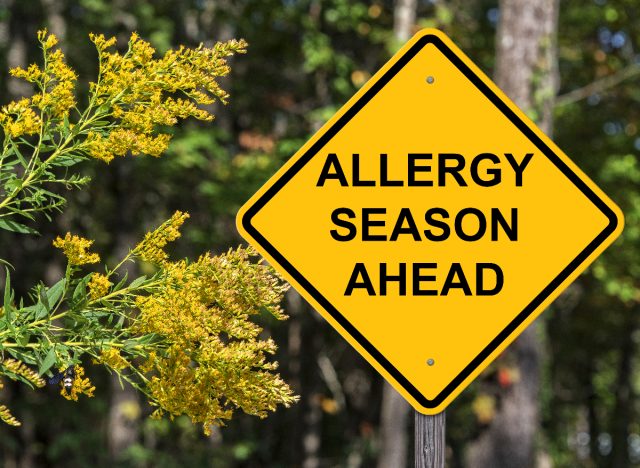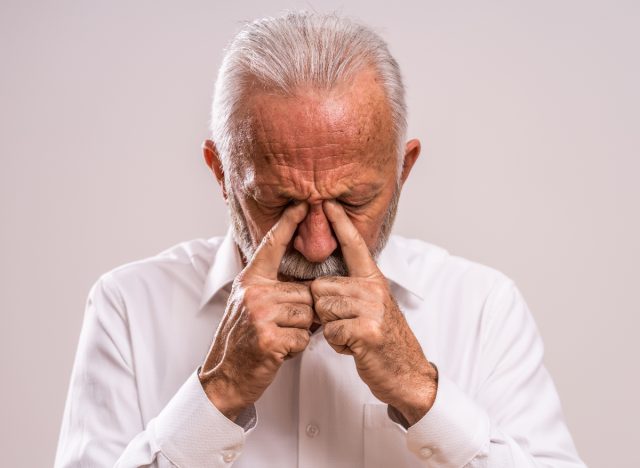Springtime can be a beautiful time of year. Flowers are blooming, trees are budding, and vibrant colors are simply popping out all over. If you deal with seasonal allergies, though, the side effects aren’t too pretty. We spoke with Dr. Jeffrey Dlott, Medical Director, QuestDirect to get the lowdown on the ugly side effects of seasonal allergies. He explains to Eat This, Not That! exactly what happens to your body when you experience allergies, stating, “Seasonal allergies refer to when the body’s immune system overreacts to outdoor stimulants, including mold spores and pollen.”
Read on to learn more about the side effects of seasonal allergies, and next, check out The 6 Best Exercises for Strong and Toned Arms in 2022, Trainer Says.


There are many symptoms of seasonal allergies, and you may experience one or a combination of several. Some people can have more severe symptoms than others, and they can include sneezing, a runny or stuffy nose, coughing, and itchy eyes, nose, mouth, and throat. Surprisingly, side effects may also include eczema, headaches, anxiety, and even tooth sensitivity due to allergy-related clogged sinuses. The latter can even create a mild tingly feeling in your gums or teeth.
Related: “Unhealthy” Exercise Habits That Can Actually Shorten Your Life, Expert Says


Dr. Dlott tells ETNT, “Location and weather play a large part in why some people experience worse seasonal allergies than others. For instance, if you live in a major metropolitan location, you could be impacted by environmental factors such as air pollution.”
In addition, if you reside in the south where the climate remains warm for a much longer period of time, it’s likely your allergies wreak havoc for longer. Dr Dlott shares that recent reports reveal allergy season is extending in more parts of the U.S. as a result of climate change and a higher amount of pollen in the air.
Related: The 5 Ugly Side Effects of Taking Melatonin Before Bed


Although it’s common to think allergies only kick in during spring and summer months, know that they can actually happen any time of the year. (Ugh!) If you’re unsure of your particular triggers, you can have what’s called a confirmatory allergy test. This includes a Weed and Grass Allergy Test Panel or a Tree Pollen Allergy Test Panel. Once you identify the sensitivity triggers of your seasonal allergy, a doctor can devise the treatment plan that’s best for you.
READ RELATED: Shake Shack Is Launching Two Major New Items Today
Dr. Dlott tells us, “The general rule of thumb to see a doctor or specialist is when season[al] allergy symptoms have [lasted] longer than three months and over-the-counter medicines or other remedies have not been effective.” He adds, “Once you identify your triggers, it is easier to establish the proper medications you should take and remedies you should consider. While medications won’t cure allergies, they can help alleviate many of the symptoms. It’s also important to note that you should start taking allergy medications two to four weeks before your allergy season(s) begins to help build up more protection. Often, people wait until they start experiencing symptoms, which delays and impacts the effectiveness of treatment. When it doubt it’s best to get ahead of it.”
Some research even suggests a link between genetics and seasonal allergies. Dr. Dlott points out that although additional research is needed in this area, if your close relative(s) experiences allergy attacks, chances are likely you might too at some point.


If you prefer natural methods to address seasonal allergies, take some advice from Dr. Dlott. “Prevention is key! Knowing what seasonal triggers you may have is key for coping with seasonal allergies. I always recommend testing for sensitivity to tree pollen allergens, weed/grass allergens, and indoor allergens. An allergy test from QuestDirect easily helps you familiarize yourself with your triggers to inform the proper steps for allergy management, prevention, and relief,” he explains.
Also, Dr. Dlott adds, that as far as natural remedies are concerned, massaging your face could help relieve sinus pain and congestion. He says, “Some people may find relief from massaging their temples, the area between the cheekbones and the upper jaw, or the area between their nasal bone and the corner of the eyes. Also, if you run your fingers down the sides of your nostril and outward across the sinus region on either side of your nose, this can help relieve pressure and open air passage.”
Although there is no cure for allergies, “minimizing outside factors” (for instance, moving your location or cutting back your exposure to outdoor allergens) can help to lessen sensitivities and seasonal allergies over time. Once you’ve identified your seasonal triggers, Dr. Dlott suggests making your immune system stronger to battle seasonal allergies. “Talk to your doctor about potential allergy shots to increase protection,” he says.
Alexa Mellardo
Source:











